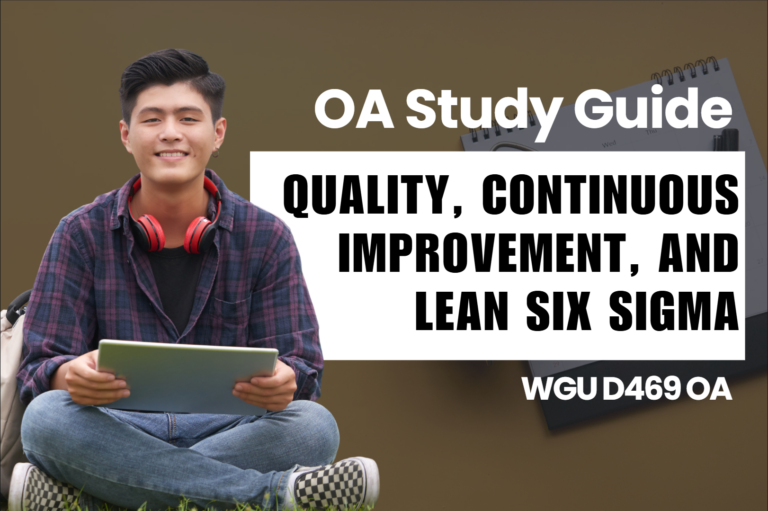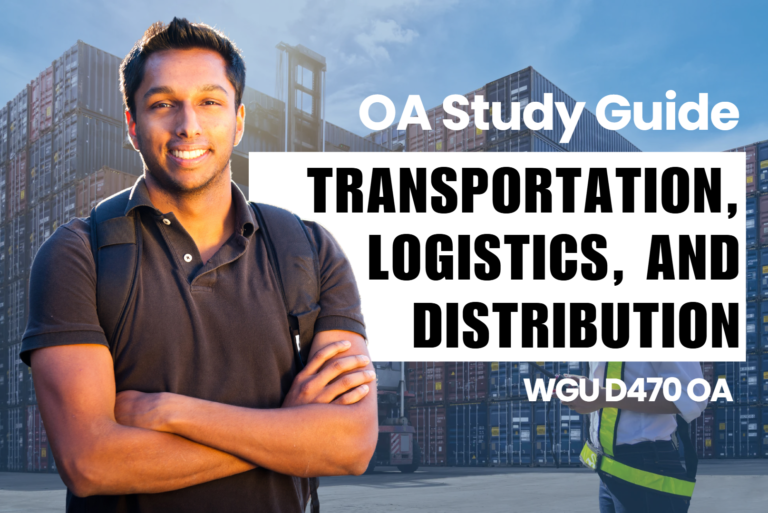Welcome to your ultimate guide on how to pass the Financial Accounting WGU D102 Objective Assessment. If you’re finding yourself struggling with the course content or unsure about the best way to prepare for the final assessment, you’ve come to the right place. This article is designed to navigate you through the D102 module, equipping you with essential information, strategic insights, and practical tips to boost your confidence and performance.
In the following sections, we’ll cover:
It’s important to note that this module emphasizes practical skills over theoretical knowledge, meaning that regular practice is crucial. By understanding and applying the functions and formulas within spreadsheets rather than just memorizing them, you’ll develop a stronger, more applicable skill set. Let’s dive into how you can effectively master this module and excel in your Objective Assessment. Without further ado, Let’s Dive In!!!
...
What to Expect in Module WGU D102 📖
Welcome to Financial Accounting D102, an essential module designed to equip you with a comprehensive understanding of accounting principles and procedures in today’s business landscape. This course presents a blend of theory and practical applications, using real company examples and solved exercises to provide a solid foundation in financial accounting. As you progress, you’ll gain insights into the terminology and processes that are crucial for understanding and leading any organization. Expect to delve deeply into various accounting subjects, building on the knowledge you’ve acquired in Principles of Accounting.
In this unit, you will find an array of instruments intended to facilitate your learning of the material being covered in this module. Detailed practice assessments are effective in showcasing the areas of the course you understand well and areas that need further learning. Brackets containing the adaptation of the language of business will enhance the usage of the flashcards as well as the searchable glossary will help in understanding new terms and words easily. The course content is presented in both textual, video, and audio formats, which gives you the flexibility of the format to learn as a team and as an individual.
In this module, you will go through the below Topics. (Weightage on the OA for each topic is mentioned as a percentage)
- Unit 1: Introduction
- Unit 2: The Primary Financial Statements (15%)
- Unit 3: Accounting Cycle Mechanics (18%)
- Unit 4: Completing the Accounting Cycle (15%)
- Unit 5: Internal Controls (10%)
- Unit 6: Receivables: Selling a Product or Service (7%)
- Unit 7: Inventory and Cost of Goods (10%)
- Unit 8: Investing and Accounting for Property, Plants, Equipment (PPE) and Intangible Assets (10%)
- Unit 9: Completing the Operating Cycle (15%)
Key topics covered in Financial Accounting D102 include the mechanics of accounting, the completion of the accounting cycle, and the purpose and differences of various financial reports. You’ll explore how these reports reflect operational performance and can be used to forecast future trends. The course will also introduce you to essential concepts such as assets, liabilities, equity, bank reconciliation methods, balance sheets, and business ethics. By relating these concepts to real-world organizations, you’ll enhance your understanding and be better prepared to communicate your knowledge to decision-makers. As you prepare for the final exam, make use of all available resources and stay consistent in your studies to achieve success.
Ultimate Study Guide📝
In this section of the article, we will provide you with a comprehensive study guide that we have developed to guide you through the course content with ease and guarantee you victory over the final assessment. The information in this guide is extracted from our deep dive into the module contents and the OA as well as from the information we received from former course takers of WGU. We hope our advice will assist you in your journey through module D102 and we wish you all the best in your studies..
Step 1 – Install Microsoft Excel and MyEducator Add-on
To begin our studies in this module, we will need to install the Microsoft Excel application. As hands-on practice is a must to learn the course material as well as to complete the OA of D102, this becomes a mandatory prerequisite. So let us install the Excel application on our personal devices. Below we have listed two YouTube videos that will assist you in installing the Excel application.
How to install Excel in Windows OS – Link
How to install Excel in MAC OS – Link
Once you successfully install the Excel application, you will have to install an additional Add-on to Excel. This Add-on called “MyEducator” is a mandatory product that you need to attempt the module-end assessments of D102. To guide you through the installation steps of this Add-in, follow the instructions given in the “D102 ME Guide” you can find by accessing the below-mentioned location.
- Go to the Student Portal of WGU > Log onto your profile > Go to the D102 module page > Click on the “Course Search” button > Find and open the link “D102 ME Guide”
Step 2 – Watch the recorded cohorts
To begin your studies of this module, we would recommend you start with the recorded cohorts provided by WGU. As the module contains practical aspects to master, the videos will help you understand the concepts better by taking you through lab activities and showing you how to apply the knowledge through a visual medium. Navigate to the below-mentioned location to find the recorded cohorts and watch all the available videos to gain your initial understanding of the course content.
- Go to the Student Portal of WGU > Log onto your profile > Go to the D102 module page > Click on the “Course Search” button > Find and open the link “D102 Links to Cohort Recordings”
Step 3 – Go through the Textbook
Now that you have an initial understanding of the core concepts of D102, let us deep dive into the course content and strengthen our knowledge to master the subject matter. To achieve this goal, we will go through the Textbook of D102 provided by WGU. The Textbook will equip you with all the necessary knowledge you require to pass the OA of this module. So take your time to read through each and every topic and understand the concepts instead of just memorizing them. Take short notes on the important information as well as make flashcards to help you revise the material at later stages of the study guide.
- Go to the Student Portal of WGU > Log onto your profile > Go to the D102 module page > Click on the “Go to course material”
At the end of each topic, you will come across unit quizzes and knowledge checks, which are placed to test your knowledge on each topic. Make sure to attempt these quizzes to help you evaluate your knowledge and identify your weaknesses. These quizzes will also prepare you for the assessments of this module and help you understand the depth of the questions that make up the OA.
Step 4 – Attend live cohorts
Even though you have gone through the course content twice already, you might still have doubts and gaps in your knowledge on certain topics and core concepts. This is understandable as the module deals with practical activities as well as functions and equations. So the best way to clarify any doubts about the course content is to attend the weekly cohorts conducted by the course instructors of this module. In these sessions, you will get to directly speak with the instructors and ask them questions directly to help you understand the complicated theories. With the extensive knowledge and experience the instructors have on this module, we guarantee that they will be able to help you with any issue you might be facing with the course content.
Step 5 – Attempt the Pre-A
After you have completed all the above steps, you should take the Pre-A of D102 to evaluate your knowledge of the module. This will be your final preparation before the OA, so attempt this mock assessment as you would attempt the real OA.
Once you complete the Pre-A you will be provided a scoresheet as per your performance. You can find this scoresheet by scrolling down to the bottom of the module page. (Refer to the image below)

This score sheet will allow you to see your knowledge in the module Unit-wise. Go through the scoresheet to find the Units you have scored the lowest on, and revise the material on those topics to fill the gaps in your knowledge. Keep repeating this process until you achieve more than an 85% score on the Pre-A.
Step 6 – Face the OA
If you have passed the Pre-A with more than 85% of the marks, you are more than ready to attempt the OA of D102. We recommend that you schedule the OA as soon as you can after passing the Pre-A to attempt the final assessment with the same mindset and refreshed knowledge. Before starting the OA, take your time to read through the Tips and Tricks for the OA section of this article to maximize your chances of passing the OA on your first attempt.
To take the D102 OA, you should:
- Schedule the OA at a convenient time and date for you
- Make sure you have a stable internet connection, a webcam, and a microphone.
- Follow the proctoring instructions and rules carefully.
- Use the same strategies and skills that you used for the Pre-A
- Relax and be confident in your abilities.
Good Luck!!
...
Tips and Tricks to Face the OA👨🏻🏫
Facing the Objective Assessment (OA) in Financial Accounting D102 can be challenging, but with the right preparation and strategies, you can maximize your performance. Here are some key tips and tricks to help you navigate this crucial part of the module:
1. Manage Your Time Wisely:
Effective time management is essential for success in the OA section. Allocate specific time slots for each question and stick to them. If you find yourself stuck on a particular question, move on and return to it later if time permits. This approach ensures that you can attempt all questions within the given time frame.
2. Follow the Recommended Steps:
The module provides exact steps for answering practical questions, and it is crucial to adhere to these guidelines. Deviating from the recommended procedures can result in lost marks. Familiarize yourself with the steps and practice them until they become second nature.
3. Focus Areas:
Be prepared to encounter questions on various topics, including:
- Perpetual and Periodic Systems: Understand the differences between these inventory accounting systems and how they impact financial statements.
- Operating, Investing, and Financing Activities: Know the sources and uses for all three categories and how they are reported in financial statements.
- Accounting Errors in Internal Controls: Be able to identify and correct errors related to assets, revenues, expenses, and liabilities.
- Breaking Down Transactions: Practice breaking down transactions on the balance sheet, as this is a common type of question in the OA section.
4. Master Debits and Credits:
A solid understanding of debits and credits is fundamental to tackling accounting questions. Once you grasp how debits and credits apply to various transactions, answering related questions becomes significantly easier. Make sure to review and practice these concepts thoroughly.
By focusing on these strategies and thoroughly preparing in each of these areas, you can approach the Objective Assessment section with confidence. Consistent practice and adherence to the recommended steps will enhance your ability to perform well and achieve success in Financial Accounting D102.
...
External Resources to Study📂
...
FAQ ❓
Q: What are the prerequisites for this course?
A: Principles of Accounting is a prerequisite for Financial Accounting D102. It ensures that students have a basic understanding of accounting concepts before advancing to more complex topics in this module.
Q: How is the course content delivered?
A: The course content is delivered through a mix of text, video, and audio formats. This blended approach allows students to engage with the material in a way that suits their learning style and schedule.
Q: What should I do if I need help with the course material?
A: If you need help with the course material, you can reach out to your instructor, participate in study groups, and utilize the available learning aids. WGU also offers various support services to assist you in your studies.
Q: How can I maximize my performance in this course?
A: To maximize your performance:
- Stay consistent with your studies
- Utilize all available resources and learning aids
- Practice the recommended steps for practical questions
- Review and understand key accounting concepts, especially debits and credits
...
Conclusion 📄
As you progress through Financial Accounting D102 at WGU, remember to apply the advice and utilize the resources we’ve provided to enhance your study approach. The comprehensive content of this module, from mastering the accounting cycle to understanding debits and credits, will equip you with essential skills for success. Follow the recommended steps, make use of the learning aids, and focus on key areas highlighted in the study guide to effectively prepare for the Objective Assessment (OA).
Time management, adherence to procedures for practical questions, and a thorough review of perpetual and periodic systems, financial activities, and internal controls are crucial for your success. Mastering these concepts will make answering questions significantly easier.
With dedication and consistent effort, you can excel in Financial Accounting D102. Use the tips and tricks shared here to navigate the OA with confidence. Best of luck in your studies, and we look forward to seeing you succeed!






